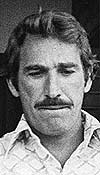May 14, 2001
Detainee staging hunger strike

Detainee staging hunger strike

Cuban militant protests at Krome
BY LUISA YANEZ
A Miami militant exile, convicted three decades ago of anti-Castro
terrorist acts, is staging a hunger strike at the Krome detention center,
hoping to focus attention again on the plight of Cubans and other foreign
nationals who serve their sentences but remain in indefinite detention
awaiting deportation.
Héctor Cornillot, 62, is on the 34th day of a hunger strike he began in an attempt to draw publicity to what he considers an unconstitutional detention.
Back in the late 1960s and '70s, Cornillot was often in the spotlight
-- linked to a string of bombings of Dade- and Los Angeles-based companies
doing
business with Cuba.
Cornillot was a known ally of Orlando Bosch, who is accused of having participated in the mid-air 1976 bombing of a Cuban airliner that killed 73 people.
Cornillot also made the list of suspects in one of Miami's most notorious crimes: the car-bombing, also in 1976, of radio personality Emilio Milián, who drew the ire of militant exiles by criticizing their violent tactics on his radio show.
At the time, Cornillot was being sought by authorities after breaking out of a Palm Beach County jail just days before the Milián bombing.
No one was ever convicted. Milián, who died in March, lost both legs in the attack.
In Miami, Cornillot was convicted in 1972 of the bombing of an Air Canada office in Miami Beach.
Until Friday, he had been at an Immigration and Naturalization Service facility in Bradenton, where he was taken after his release from prison in August -- this time after serving a 12-year sentence on drug charges.
Over the weekend, Cornillot was moved to Krome, where he can be medically monitored, immigration officials confirmed.
So far, he has lost approximately 20 pounds and weighs about 160.
Cornillot is only drinking water.
"He has the right to refuse food, but there was concern about his condition, so he was moved to Krome because it has a larger medical facility,'' INS spokesman Rodney Germain said Sunday.
Cornillot is currently the only hunger striker at Krome, but he is not the first to denounce the INS detention practice by refusing food.
In 1999, a group of Miami mothers of INS detainees in the same predicament staged a hunger strike outside Krome and eventually won the release of many of their men.
Last week, Cornillot told the Bradenton Herald before his transfer that he is desperate and will even consider being sent to Cuba, which he left as a teenager.
"I am tortured here,'' Cornillot told the newspaper. ``There are hundreds of us stuck here indefinitely. We have all finished serving our time. But now we have no right to a trial. And we don't know how long we are going to be here.''
For Miami exiles, Cornillot's name harkens back to a period in the history of the exile Cuban community when individuals and groups turned to violence against fellow exiles in their quest to bring about an end to the Castro regime.
Bombings were their calling card. Between 1973 and 1976 alone, there were more than 100 politically motivated explosions in South Florida blamed on groups and men like Bosch, Rolando Otero,Luis Crespo, Eduardo Arocena's Omega 7 and Cornillot's group, Cuban Power.
Today, after spending 23 of the last 33 years in prison, a remorseful Cornillot said he is ready to give up and go home to his family.
"I am more than sorry for everything I have done. It was so stupid,'' Cornillot told the Bradenton Herald. ``Violence is not the answer.''
In an earlier letter to a court, Cornillot denied he was a fanatical
terrorist and said he was participating in the bombings only because he
believed it to be his duty to
combat Castro.
He added he now realized he did his cause more harm than good, he told the Bradenton Herald.
Cornillot's anti-Castro activism first landed him in jail in 1968 in Los Angeles, when he and an accomplice were arrested and charged with setting off five bombs within a two-hour period in July. The targets were the Mexican Tourist Council, a Shell data processing center, an Air France office and a Japan Airlines office. No one was injured.
But his criminal past, which also includes his escape and recapture
in 1972 by the FBI from the Glades Correctional Institution, where he was
serving time before the
Miami Beach bombing, have deemed him a threat to society.
"For now, he won't be released, but these types of cases are reviewed every few months,'' Germain said.
Nationwide, thousands more Cuban detainees are being held for
an indefinite amount of time, a result of 1996 immigration laws. In June,
the U.S. Supreme Court is
expected to decide whether long-term detentions are constitutional.
After months of waiting for his release from Bradenton, Cornillot decided to take action and declared himself on a hunger strike. He also has written a letter to the United Nations Office of the High Commissioner for Human Rights, asking for an investigation.
Cornillot said he's willing to risk his life for his cause.
"I will take my protest to the limit, even if it means death,'' Cornillot told the newspaper. ``I am going to die behind bars anyway. This way, I may help my country.''
Irina Slutsky of the Bradenton Herald contributed to this report.
© 2001